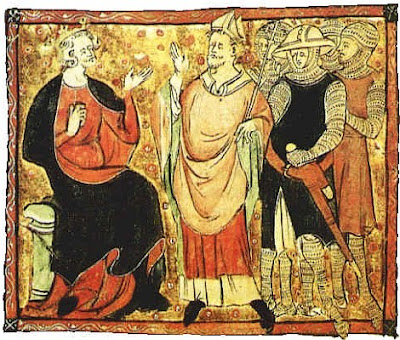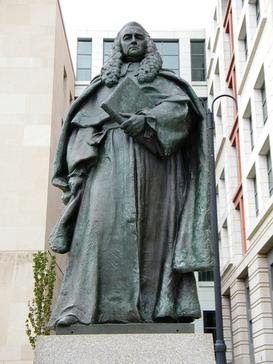Note: Sir William Blackstone was writing in the eighteenth century. But in the quotations given from him in this particular blog post, he discusses many events from back in the twelfth century - or, more broadly, from the Middle Ages.
Wikipedia claims that Blackstone “omitted” the Constitutions of Clarendon …
As I mentioned in a previous post, I’ve often enjoyed reading articles from Wikipedia, and have linked to a number of these articles from my own blog over the years. Some of these articles are reliable, while others are not. Many of them are somewhere in between. Possibly one of these articles to be somewhere in between is the article about William Blackstone, which contained some good information about William Blackstone, and some bad information. For example, the “Criticism” section of that page said that “English jurist Jeremy Bentham was a critic of Blackstone's theories.[132] Others saw Blackstone's theories as inaccurate statements of English law, using the Constitutions of Clarendon, the Tractatus of Glanville and the 1689 Bill of Rights as particularly obvious examples of laws Blackstone omitted.” (Source: “William Blackstone” page, “Criticism” section)
Jeremy Bentham
… and the Tractatus of Glanville (which it refers to as a “law”)
The part about how “English jurist Jeremy Bentham was a critic of Blackstone's theories” is properly sourced at the “[132]”. While I don't agree with Bentham's criticisms (indeed, I find them wildly inaccurate), I do agree that he was “a critic of Blackstone's theories” – this much is pretty well-established, and that is all that the source claims here. But the second sentence has no source, which makes me wonder who exactly is making these criticisms. The sentence in question says that “Others saw Blackstone's theories as inaccurate statements of English law, using the Constitutions of Clarendon, the Tractatus of Glanville and the 1689 Bill of Rights as particularly obvious examples of laws Blackstone omitted.” I have shown in a separate post that Blackstone did indeed mention the 1689 Bill of Rights, and thus did not “omit” it. In this post, I will show that he mentioned the Constitutions of Clarendon and the Tractatus of Glanville, the other topics that he is here erroneously accused of “omitt[ing].”
Jeremy Bentham
But in fact, the “Tractatus of Glanville” is not a “law” at all …
First, I will discuss the Tractatus of Glanville. As you might expect, Wikipedia has a separate page on the Tractatus of Glanville. Indeed, it links to that page in the passage quoted above, at its mention of the “Tractatus of Glanville.” But as that page itself shows, the “Tractatus of Glanville” is not a “law” at all. For example, the page says that “The Tractatus de legibus et consuetudinibus regni Angliae (Treatise on the Laws and Customs of the Kingdom of England), often called Glanvill treatise, is the earliest treatise on English law. Attributed to Ranulf de Glanvill (died 1190) and dated 1187–1189, it was revolutionary in its systematic codification that defined legal process and introduced writs, innovations that have survived to the present day. It is considered a book of authority in English common law.” (Source: Their page on the “Tractatus of Glanville”)
A reprinting of the Tractatus of Glanville from 1780 (the year of Blackstone’s death)
Rather, it is a treatise on the law (see the definition of a “treatise” below)
Thus, the Tractatus of Glanville is not a “law” at all, but a treatise on law. Another Wikipedia page defines a treatise as “a formal and systematic written discourse on some subject, generally longer and treating it in greater depth than an essay, and more concerned with investigating or exposing the principles of the subject and its conclusions.” (Source: Their page entitled “Treatise”) A “formal and systematic written discourse” is not the same as a “law.” It is a “book of authority” in English common law, but it is not a “law” itself. Thus, the argument that it is among some “particularly obvious examples of laws Blackstone omitted” is wrong even to suggest that it was a law in the first place. But they are also wrong to say that Blackstone “omitted” it, because he did in fact mention it, as I will show below.
Sir William Blackstone
Blackstone does not mention the Tractatus by name …
In fairness, I must acknowledge that he did not mention the Tractatus by name in the passages that I will cite here. But he certainly mentions Glanville and his “treatise,” albeit with a different spelling of the name “Glanville.” In his “Commentaries on the Laws of England,” Blackstone mentioned it in the very last chapter of the very last book. Here is the passage that I refer to:
King Henry the Second, mentioned below
… but he did mention an “excellent treatise of Glanvil” …
“By the time of king Henry the second, if not earlier, the charter of Henry the first seems to have been forgotten: for we find the claim of marriage, ward, and relief, then flourishing in full vigour. The right of primogeniture seems also to have tacitly revived, being found more convenient for the public than the parceling of estates into a multitude of minute subdivisions. However in this prince's reign much was done to methodize the laws, and reduce them into a regular order; as appears from that excellent treatise of Glanvil: which, though some of it be now antiquated and altered, yet, when compared with the code of Henry the first, it carries a manifest superiority [footnote].” (Source: Book 4, Chapter 33)
King Henry the First, mentioned above
… which is almost certainly the Tractatus (and I explain why below)
“Glanvil” is not known to have authored any other “treatise” besides the Tractatus, “excellent” or otherwise. Thus, it seems that he could only have been referring to the Tractatus. But you don’t have to go to the very last chapter of the very last book to see such evidence. There is also a mention of it in the introduction to Blackstone’s “Commentaries,” written by Blackstone himself. Here is the quotation below:
Sir William Blackstone
Blackstone also said that “great veneration and respect” is paid to Glanville …
“Besides these reporters, there are also other authors, to whom great veneration and respect is paid by the students of the common law. Such are Glanvil and Bracton, Britton and Fleta, Littleton and Fitzherbert, with some others of antient date, whose treatises are cited as authority; and are evidence that cases have formerly happened in which such and such points were determined, which are now become settled and first principles.” (Source: Introduction, Section 3)
Sir Thomas de Littleton, another of the people mentioned above
… by students of the common law
Thus, Blackstone not only referred to the “excellent treatise of Glanvil,” but also listed Glanville among the authors “to whom great veneration and respect is paid by the students of the common law.” Had Blackstone’s critics bothered to examine even the introduction to Blackstone’s “Commentaries,” their argument would have been unsustainable. But one gets the feeling that they never even read that.
Sir William Blackstone
Blackstone also mentioned the Constitutions of Clarendon …
Now let me address his alleged “omitt[ing]” of the Constitutions of Clarendon. Blackstone refers to them in the “Commentaries” – again, in the very last chapter of the very last book. Here is the relevant passage:
12th-century depiction of Henry II with Thomas Becket (both of whom are mentioned below)
… or as he called them, the “constitutions of the parliament at Clarendon, A. D. 1164”
“In the present reign, of Henry the second, there are four things which peculiarly merit the attention of a legal antiquarian: 1. The constitutions of the parliament at Clarendon, A. D. 1164. whereby the king checked the power of the pope and his clergy, and greatly narrowed the total exemption they claimed from the secular jurisdiction: though his farther progress was unhappily stopped, by the fatal event of the disputes between him and archbishop Becket.” (Source: Book 4, Chapter 33)
Thomas Becket, the Archbishop of Canterbury (mentioned above)
Thus, Blackstone didn’t “omit” either of these things …
Blackstone then proceeds to mention the other three things that he referenced in this passage above. But the relevant part of this passage is his mention of the “constitutions of the parliament at Clarendon, A. D. 1164.” Thus, the argument that the Constitutions of Clarendon and the Tractatus of Glanville were among some “particularly obvious examples of laws Blackstone omitted” is demonstrably false – Blackstone didn't “omit” them. And as mentioned earlier, the Tractatus of Glanville wasn’t a “law” anyway, which is another error that these critics seem to have made.
Sir William Blackstone
… and these Blackstone critics come across as a bit misinformed
Thus, the unnamed people that are making these arguments would seem to be a little misinformed. One gets the feeling that they never actually read the book that they’re venturing to criticize. At the very least, they didn’t read it very carefully, and should not be considered authorities on either William Blackstone or his writings. (For evidence that Blackstone also mentioned the 1689 Bill of Rights, see this blog post.)
Disclaimer: If Wikipedia has changed any of these pages by the time that you read this, some of this information may have become outdated. If so, please let me know with a comment below; and I will be happy to either remove or revise this blog post as needed. In the meantime, I will leave this blog post up as a response to Wikipedia, and hope that someone at Wikipedia corrects these rather gross and egregious errors.
Related Hollywood movies:
If you liked this post, you might also like:
Part of a series about
Sir William Blackstone
The primary function of government is to protect our most basic rights
Hamilton quoted from Blackstone when discussing the Habeas Corpus Act
Hamilton quoted from Blackstone when discussing the Habeas Corpus Act
Wikipedia has some bad information about William Blackstone
Private property is a cornerstone of English-speaking law
There are some rights that exist mainly to protect other rights
How did Sir Edward Coke influence Sir William Blackstone?
The British Parliament was the main model for the United States Congress
5 surprising ways that the Congress was modeled on the British Parliament
Yes, Blackstone was a monarchist – but not an absolute monarchist
Difference between the presidency and the prior British monarchy
How did the Founding Fathers use Blackstone's writings about the monarchy?
Giving Congress the power to coin money was a break with British precedents
How the legislature can give legal permission to be a “pirate” (er, “privateer”)
What is “corruption of blood, or forfeiture” from an attainder of treason?
There are some rights that exist mainly to protect other rights
How did Sir Edward Coke influence Sir William Blackstone?
The British Parliament was the main model for the United States Congress
5 surprising ways that the Congress was modeled on the British Parliament
Yes, Blackstone was a monarchist – but not an absolute monarchist
Difference between the presidency and the prior British monarchy
How did the Founding Fathers use Blackstone's writings about the monarchy?
Giving Congress the power to coin money was a break with British precedents
How the legislature can give legal permission to be a “pirate” (er, “privateer”)
What is “corruption of blood, or forfeiture” from an attainder of treason?















No comments:
Post a Comment